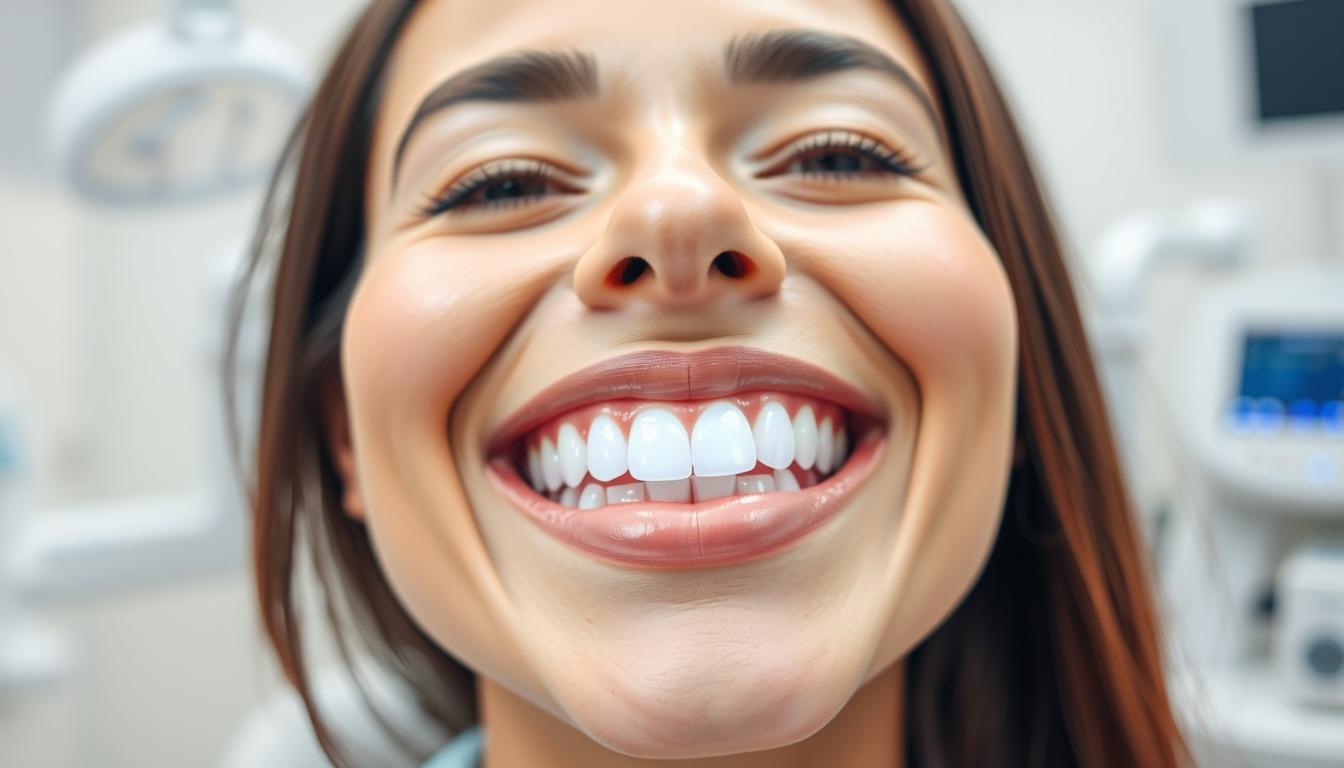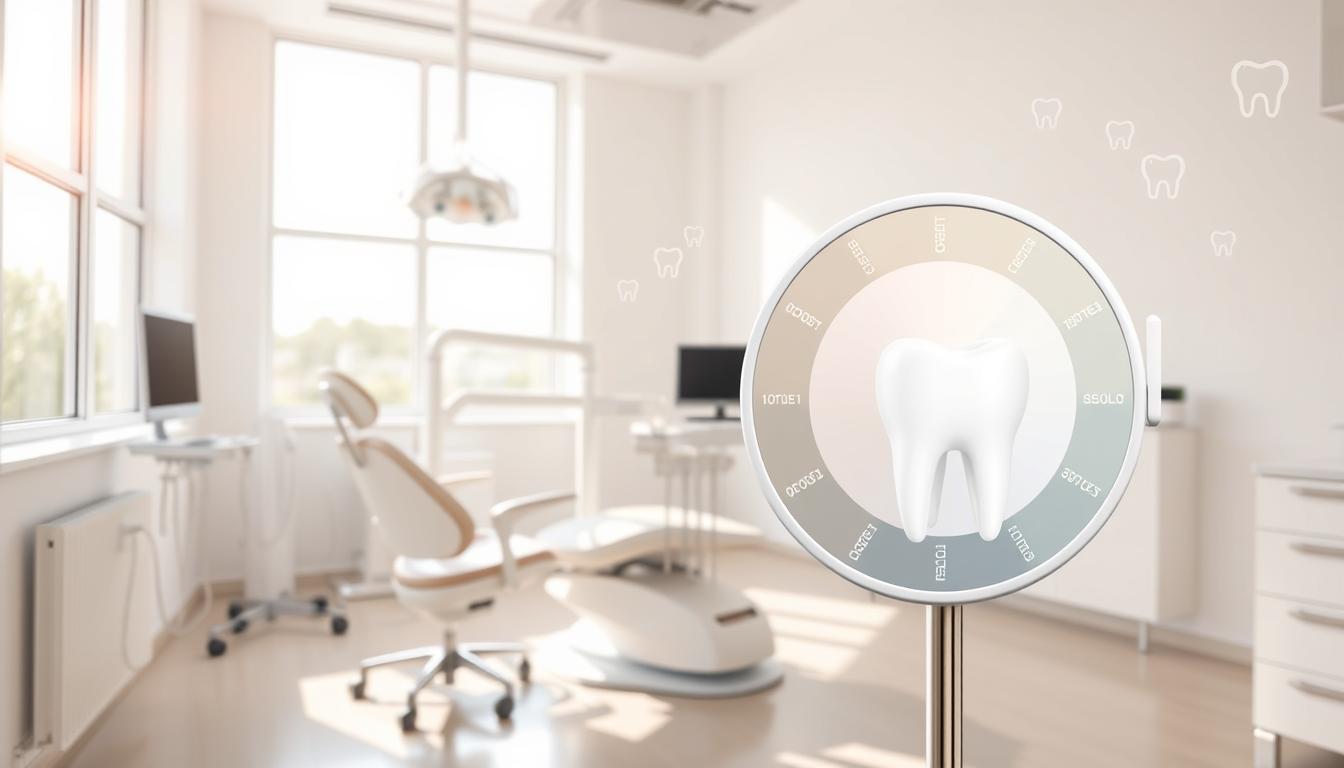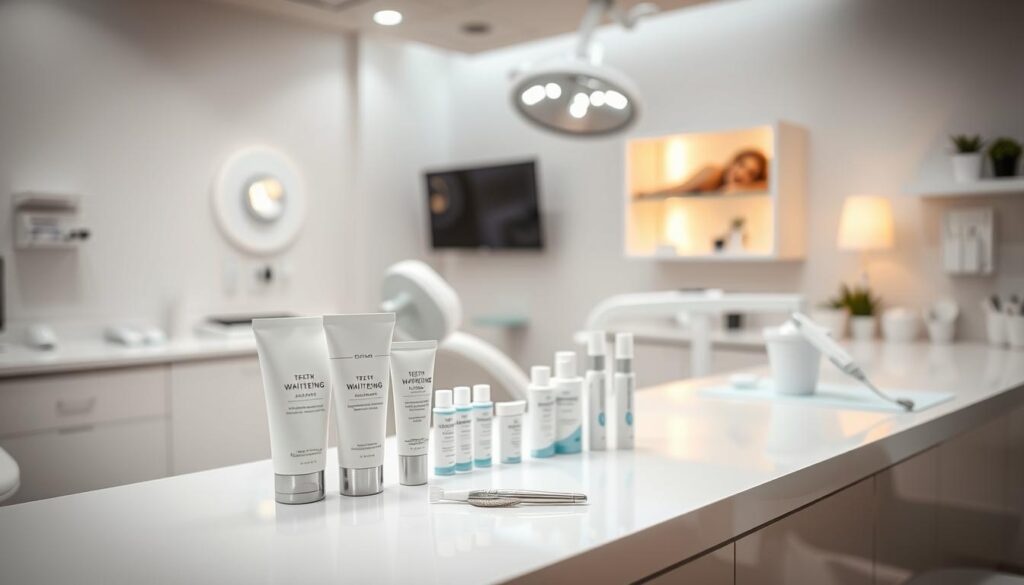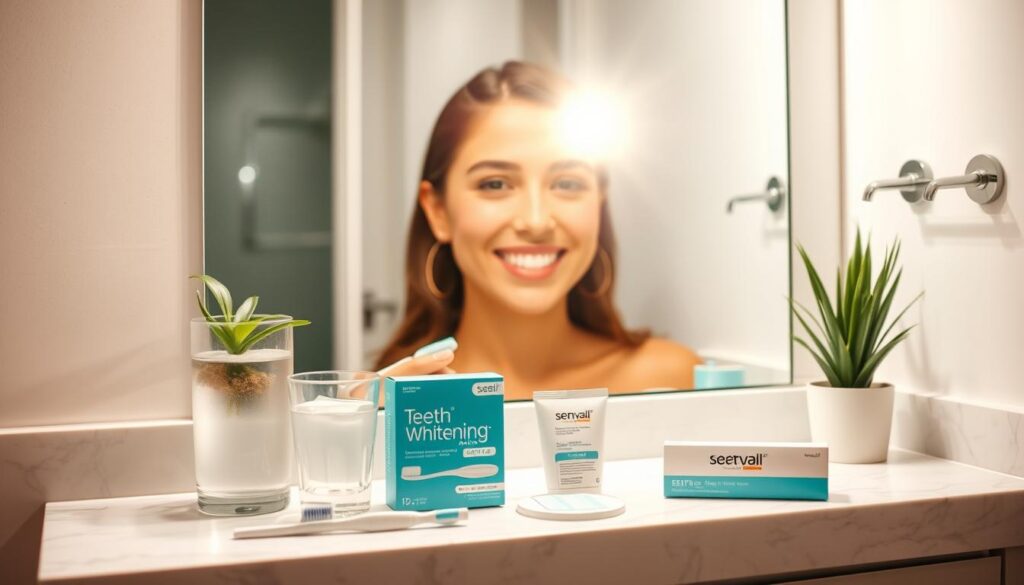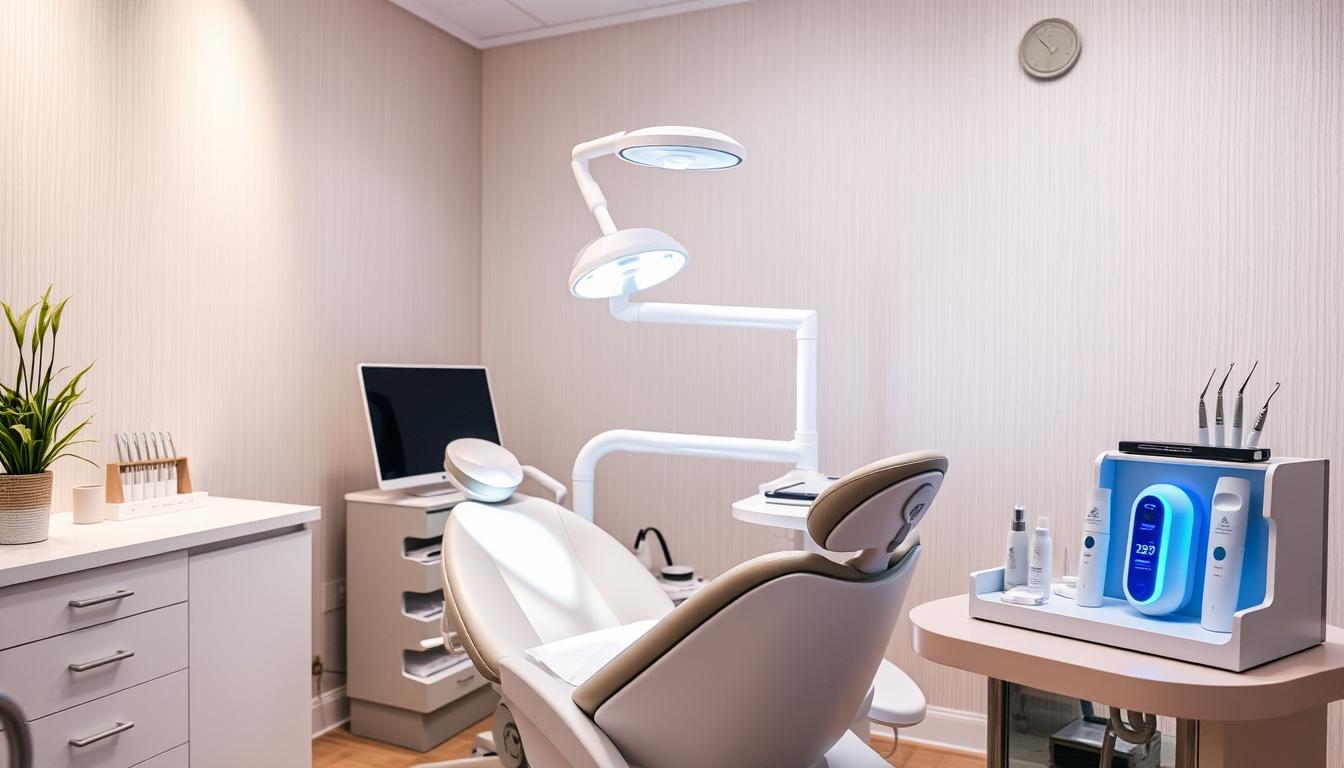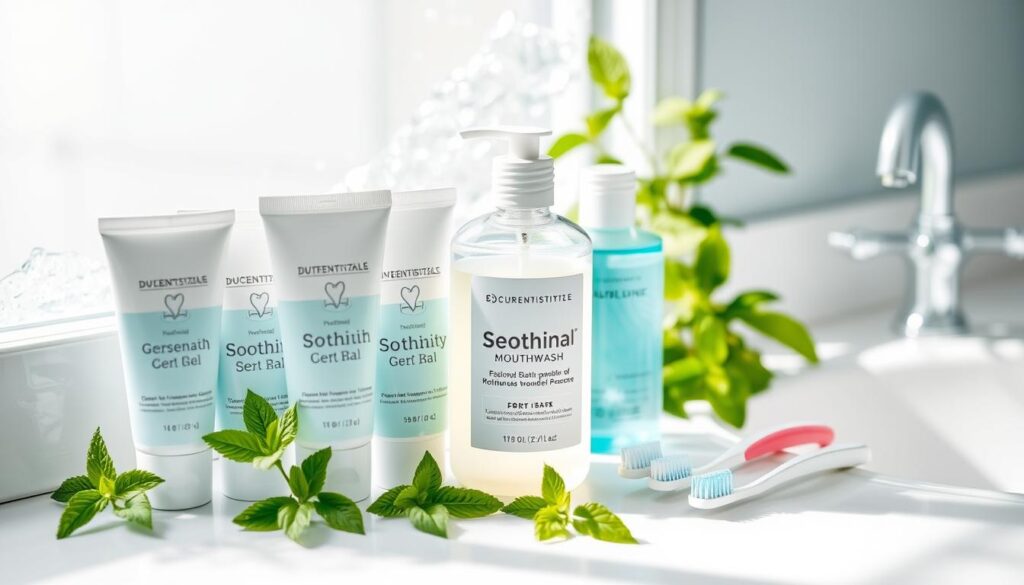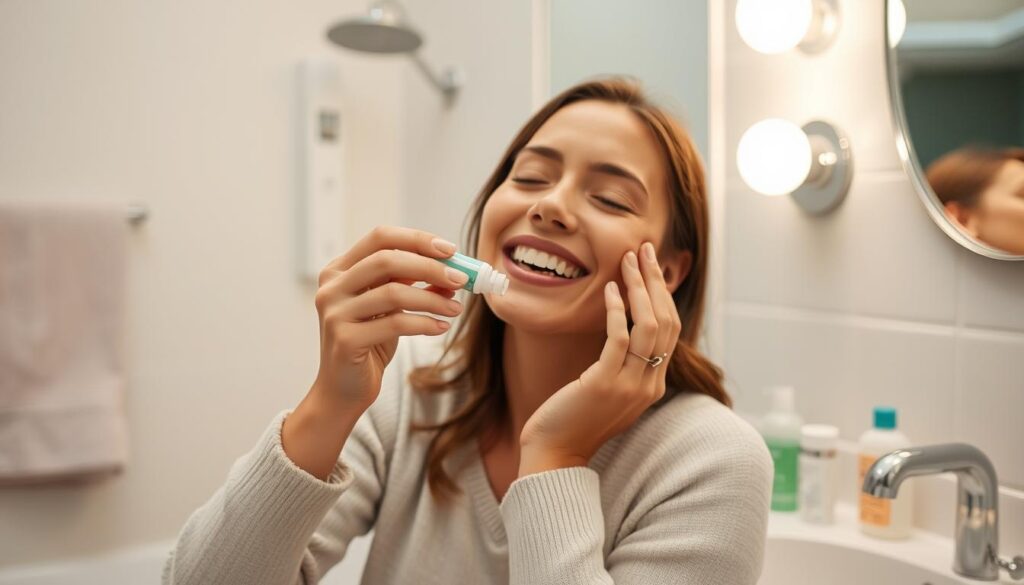Professional Teeth whitening is a popular cosmetic dentistry procedure. It can make your teeth look much better. The time your teeth whitening lasts varies based on several factors. Knowing how long your whitening will last is key to keeping your smile bright and healthy.
When you think about getting your teeth whitened, you might wonder how long it will last. The time it lasts can differ from person to person. But, with the right care and choices, you can keep your smile white for longer. Your whitening results can be affected by what you eat and your lifestyle.
To get the best out of your teeth whitening, it’s important to know what can affect how long it lasts. Taking good care of your teeth and making smart choices can help your whitening last longer. Teeth whitening is a safe and effective way to brighten your smile. With the right care, you can enjoy your brighter smile for a longer time.
Key Takeaways
- Professional Teeth whitening results can last for a varying amount of time
- The longevity of teeth whitening results depends on several factors
- Dietary habits and lifestyle choices can impact the duration of results
- Proper care and maintenance are essential to extend the duration of results
- Professional Teeth whitening is a safe and effective way to achieve a brighter smile
- Understanding the factors that influence results can help you make informed decisions
Understanding Professional Teeth Whitening
Professional teeth whitening is a popular cosmetic dentistry procedure. It can greatly improve your teeth’s appearance. The professional teeth whitening procedure uses high-quality whitening agents. These agents are applied to the teeth to remove stains and discoloration.
This procedure is different from over-the-counter whitening products. It is customized for each person and done under a dental professional’s supervision.
The goal of professional teeth whitening is to remove deep-seated stains and discoloration. This is done using advanced whitening agents and techniques. These methods penetrate the tooth enamel and dentin, making your smile brighter and more radiant.
What Makes Professional Whitening Different
Professional whitening stands out because it’s a customized procedure. A dental professional assesses your teeth and decides the best treatment for you.
Types of Professional Whitening Treatments
There are several professional whitening treatments available. These include in-office bleaching and at-home whitening trays. In-office bleaching uses a high-concentration whitening agent applied directly to the teeth.
At-home whitening trays use a lower-concentration agent. This agent is applied to the teeth using a custom-fitted tray.
The Science Behind the Process
The science behind professional teeth whitening involves advanced whitening agents. These agents penetrate the tooth enamel and dentin. This results in a brighter and more radiant smile.
The whitening agents break down stains and discoloration on the teeth. This makes the teeth color more even and uniform.
Typical Duration of Whitening Results
Teeth whitening results can vary from person to person. Professional whitening can last months to years. To keep your teeth white, practice good oral hygiene and eat healthy.
Several factors can affect how long your whitening lasts:
- Oral hygiene practices: Brushing and flossing regularly helps keep teeth white longer.
- Dietary habits: Staying away from staining foods and drinks, like coffee and red wine, helps.
- Lifestyle choices: Quitting smoking and eating less sugar also helps keep teeth white.
On average, in-office whitening results last 3-6 months and custom try whitening can last 6-12 months. It’s key to keep up with oral care and see your dentist often.
Knowing what affects whitening results and how to maintain them can make your smile brighter and healthier for longer.
Factors That Impact the Longevity of Professional Teeth Whitening
Many things can affect how long your teeth stay white after professional whitening. Knowing these factors helps keep your teeth looking bright. Your lifestyle and daily habits play a big role in how long your whitening lasts.
What you eat and drink can stain your teeth. Foods like coffee, tea, and red wine can cause discoloration. Practicing good oral hygiene and avoiding these foods helps keep your teeth white.
Dietary Habits and Staining Foods
- Avoid consuming staining foods and drinks
- Practice good oral hygiene
- Use a straw when drinking staining beverages
Smoking and other harmful habits can also affect your whitening results. Quitting smoking and avoiding these habits helps keep your teeth white. Regular dental visits and cleanings are key to keeping your teeth bright.
Lifestyle Choices
Simple changes in your lifestyle can help your teeth stay white longer. This includes maintaining good oral hygiene practices and avoiding stains. By doing these things, you can enjoy your white teeth for longer and keep a healthy smile.
The Professional Teeth Whitening Procedure
When you get a professional teeth whitening procedure, you might wonder what happens. First, you’ll have a consultation to figure out the best treatment for you. This includes checking your teeth and gums to see if you’re a good candidate.
The professional teeth whitening procedure itself starts with applying a whitening agent to your teeth. Then, a special light is used to activate it. This whole process can take 30 minutes to an hour, depending on what you want and the treatment type.
Here are some key steps in the procedure:
- Preparation: Your teeth are cleaned and ready for the whitening agent.
- Application: The whitening agent is put on your teeth.
- Activation: The agent is made to work by a special light.
After the treatment, you might feel some sensitivity. But this usually goes away quickly. You can use desensitizing toothpaste or other products to help. Remember, keeping up with good oral hygiene is key to keeping your teeth white.
Immediate Results and Recovery Period
After getting teeth whitening, you might wonder about the recovery. The first 24 hours are key to keeping your teeth whitening results and ensuring a smooth recovery. You might feel some sensitivity, which is normal.
To handle sensitivity, try a desensitizing toothpaste or mouthwash. Avoid hot or cold foods and drinks for a few hours. Drinking lots of water can help reduce sensitivity and keep your teeth white.
What to Expect During First 24 Hours
- Avoid consuming staining foods and drinks, such as coffee, tea, or red wine
- Use a soft-bristled toothbrush and gentle toothpaste to clean your teeth
- Refrain from smoking or using tobacco products, as they can stain your teeth
Managing Sensitivity
If sensitivity happens, use a straw for cold drinks or eat soft foods. Always follow your dentist’s advice for a smooth recovery and best teeth whitening results.
By following these tips, you can lessen sensitivity and enjoy your new smile. Don’t forget to see your dentist for follow-ups to keep your maintaining whitened teeth and results lasting.
Maintaining Your Bright Smile
To keep your teeth shining after whitening, start a daily routine. Brush your teeth twice a day with fluoride toothpaste. Don’t forget to floss once a day to remove plaque and food bits. Regular dental visits are key to check your teeth and gums’ health.
Getting touch-up treatments from your dentist is also important. They help keep your teeth bright. A mix of daily care and professional visits will keep your smile shining for longer.
Daily Care Routine
- Brush your teeth at least twice a day with a fluoride toothpaste
- Floss once a day to remove plaque and food particles
- Use a mouthwash to kill bacteria and freshen your breath
Professional Follow-up Care
Regular dental visits and touch-ups are crucial. They help keep your teeth whitened. By brushing, flossing, and visiting your dentist, your teeth will stay bright.
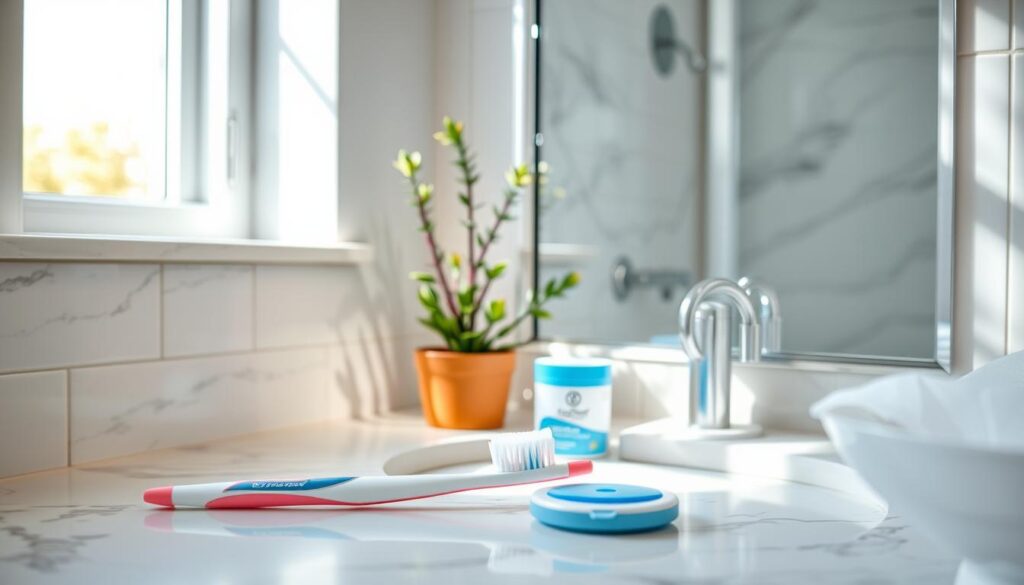
Keeping your teeth white needs both daily care and dentist visits. Follow these steps to keep your teeth shining and enjoy whitening benefits for longer.
Common Causes of Color Regression
After getting your teeth whitened, it’s key to know why they might lose their brightness. Color regression happens when your teeth start to look less white over time. This can be due to diet, smoking, and not taking good care of your teeth.
To keep your teeth white, you need to brush and floss well and live a healthy life. Some reasons why your teeth might lose their whiteness include:
- Eating foods and drinks that stain, like coffee, tea, and red wine
- Smoking and using tobacco, which can make your teeth very discolored
- Not brushing and flossing enough
To stop or slow down color regression, it’s important to live a healthy lifestyle and brush and floss regularly. Knowing what causes color regression helps you take steps to prevent it. This way, you can keep your teeth white longer and have a brighter smile.
Touch-up Treatments and Their Timing
Touch-up treatments are key to keeping your teeth white. They stop the color from fading back. How often you need them depends on your lifestyle and what you eat.
Getting regular touch-ups keeps your teeth looking bright longer. You should plan to get them every 6-12 months. Touch-ups are cheaper than the first whitening treatment.
When to Schedule Touch-ups
It’s important to book touch-ups when your teeth start to look less white. This can happen if you eat foods that stain teeth or don’t brush well. Regular touch-ups help keep your teeth looking their best.
Cost Considerations
Thinking about the cost of touch-ups is important. The first whitening might seem pricey, but touch-ups are much cheaper. They usually cost between $100 to $300, depending on where you live and who you see. Talk to your dentist about how often and how much touch-ups will cost.
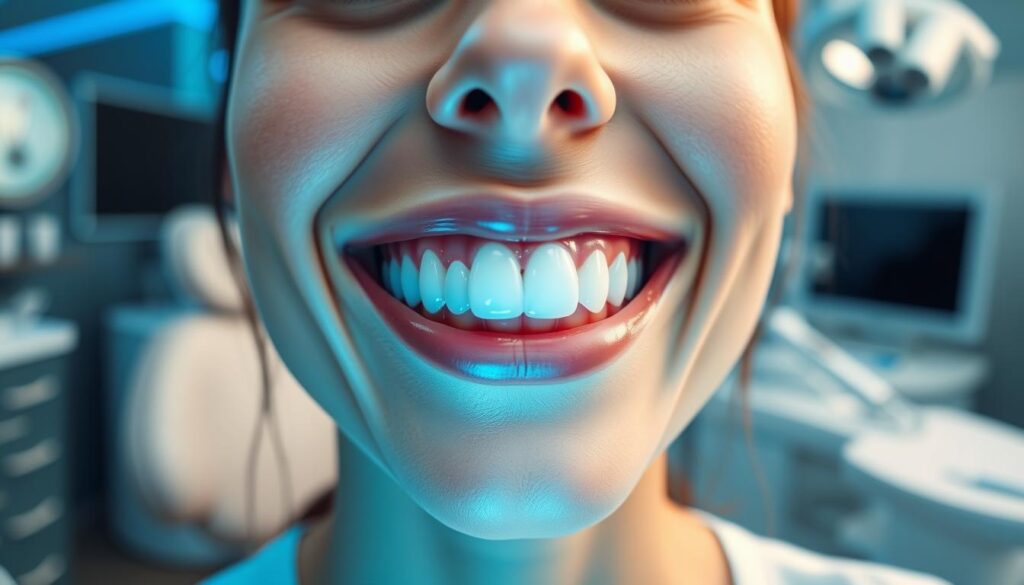
Comparing Long-term Value to Other Whitening Methods
There are many ways to get a brighter smile, like over-the-counter products and DIY treatments. But, a professional teeth whitening procedure is different. It’s more effective, safe, and lasts longer.
Professional teeth whitening is tailored to your needs and tooth type. This means a more even and lasting whitening effect. Some key benefits include:
- Customized treatment plans
- Advanced whitening technology
- Professional guidance and aftercare
A study found that professional teeth whitening can last up to 3 years with good care. This makes it a smart choice for a long-term solution. Over-the-counter products and DIY treatments may not last as long and can cause tooth sensitivity.
Choosing professional teeth whitening means a brighter, healthier smile for longer. It’s a great investment in your oral health and overall well-being.
| Method | Longevity | Effectiveness |
|---|---|---|
| Professional Teeth Whitening | Up to 3 years | High |
| Over-the-counter Products | Several months | Medium |
| DIY Treatments | Several weeks | Low |
Tips for Extending Your Whitening Results
To keep your teeth white after professional whitening, make some simple changes. These can help your whitening last longer. Just a few tweaks to your daily routine can make a big difference.
Being careful about what you eat is key to a bright smile. Some foods and drinks can stain your teeth. So, it’s smart to cut down on them. Dietary modifications are crucial. For instance, try to drink less coffee, tea, and red wine, as they can stain your teeth.
Dietary Modifications
- Avoid sugary snacks and drinks
- Limit your consumption of staining foods and drinks
- Drink plenty of water to help rinse away bacteria and food particles
Product Recommendations
Choosing the right oral care products is also important. Look for toothpastes and mouthwashes with hydrogen peroxide or carbamide peroxide. These can help keep your teeth white. By using these products and sticking to a good oral care routine, you can keep your smile bright for longer.
By following these tips, you can keep your teeth white and your smile bright. Remember, keeping your teeth white takes effort. But with the right approach and products, you can enjoy a white smile for years. This will help you achieve the best teeth whitening results.
| Product | Ingredients | Benefits |
|---|---|---|
| Whitening Toothpaste | Hydrogen Peroxide | Helps maintain whitened teeth |
| Whitening Mouthwash | Carbamide Peroxide | Helps remove stains and bacteria |
Conclusion: Making Your Whitening Results Last
Professional teeth whitening can change your smile for the better. But, keeping it that way needs dedication. Knowing what affects how long it lasts and sticking to a good care routine helps keep your teeth shining.
Stay away from foods and drinks that stain, brush and floss well, and get touch-ups from your dentist. A bit of work can make your whitening last, making you feel more confident and happy.
Start your journey to a brighter smile by talking to a dentist about whitening. It’s an investment in yourself. Enjoy the lasting glow of a healthy, stunning smile.
FAQ
How long do professional teeth whitening results last?
Professional teeth whitening results can last from 6 months to 2 years. This depends on your diet, lifestyle, and how well you take care of your teeth.
What makes professional whitening different from other whitening methods?
Professional whitening is more effective and lasts longer than DIY methods. It uses stronger agents and is done under a dentist’s supervision for better results.
What are the typical types of professional whitening treatments?
Common treatments include in-office bleaching and take-home trays. In-office bleaching uses a strong gel, while trays are worn at home for weeks.
How does the science behind professional teeth whitening work?
Treatments use carbamide peroxide or hydrogen peroxide. These ingredients break down stains, making your teeth brighter and whiter.
What can I expect during the first 24 hours after a professional whitening procedure?
Right after, your teeth will look whiter. You might feel some sensitivity or discomfort. Use desensitizing toothpaste and avoid hot or cold foods and drinks.
How can I maintain my whitened teeth?
Keep your teeth white by brushing, flossing, and using whitening toothpaste. Regular cleanings and touch-ups also help keep your teeth bright.
What are the common causes of color regression after teeth whitening?
Color regression can happen due to staining foods, smoking, and poor oral hygiene. These factors can make your teeth lose their whiteness over time.
When should I schedule touch-up treatments to maintain my whitened teeth?
You might need touch-ups every 6 to 12 months. The cost varies based on your location and dental provider.
How does the long-term value of professional teeth whitening compare to other whitening methods?
Professional whitening is more expensive upfront but lasts longer. It’s a better value in the long run compared to DIY or over-the-counter options.
What tips can I follow to extend the longevity of my whitening results?
To keep your teeth white, avoid staining foods and drinks. Use whitening toothpaste and rinses to maintain your smile’s brightness.

